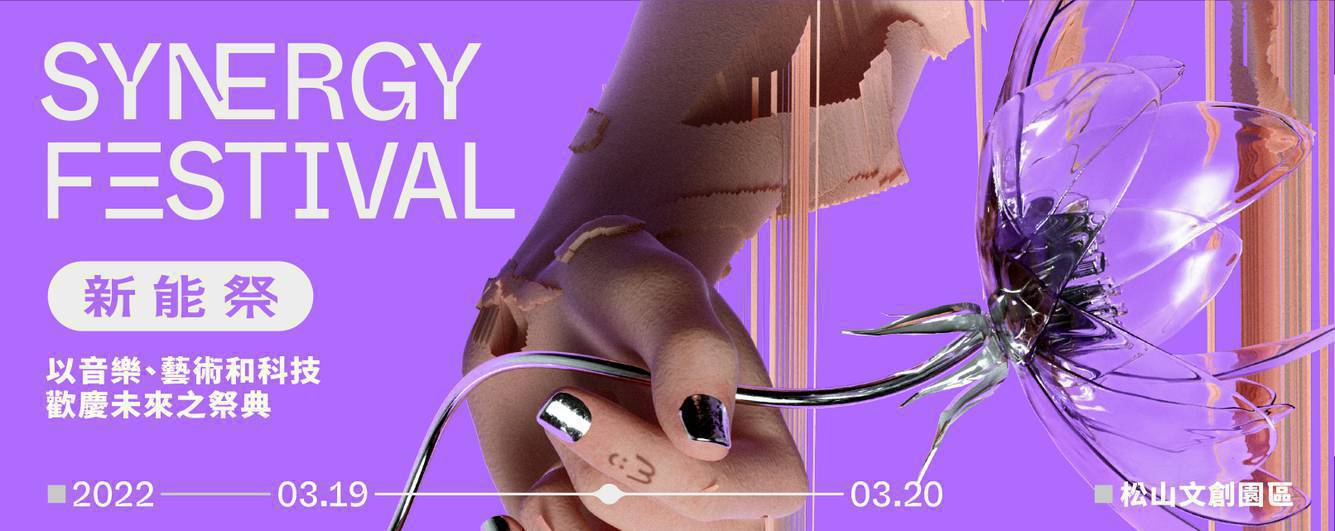by Brian Hioe
語言:
English/// 中文
Photo Credit: 新能祭 SYNERGY FESTIVAL
Brian Hioe spoke to Sonia Calico and Lee Yen-yi about the upcoming Synergy Festival, which will be held at Songshan Cultural And Creative Park on March 19th and 20th. The following article originally appeared on Electric Soul, a Hong Kong-based electronic music magazine and ticketing platform, on March 10th.
Brian Hioe: Could you first introduce yourself to readers that don’t know you?
Sonia Calico: I’m Sonia. My DJ and artist name is Sonia Calico. I’m a producer and DJ, as well as a party promoter. This time, I’m helping organize a music festival.
It’s hard to say what role I’m playing exactly right now. Originally, it was more like curating the music and performances. But now it’s all mixed up, including PR and marketing, as well as stage design and various design for the experiences. Organizer, I guess.
I thought originally that the performer could just be like a mascot for the festival. [Laughs] To just be a symbol for the music festival. But I ended up being part of a lot of the work, as well.
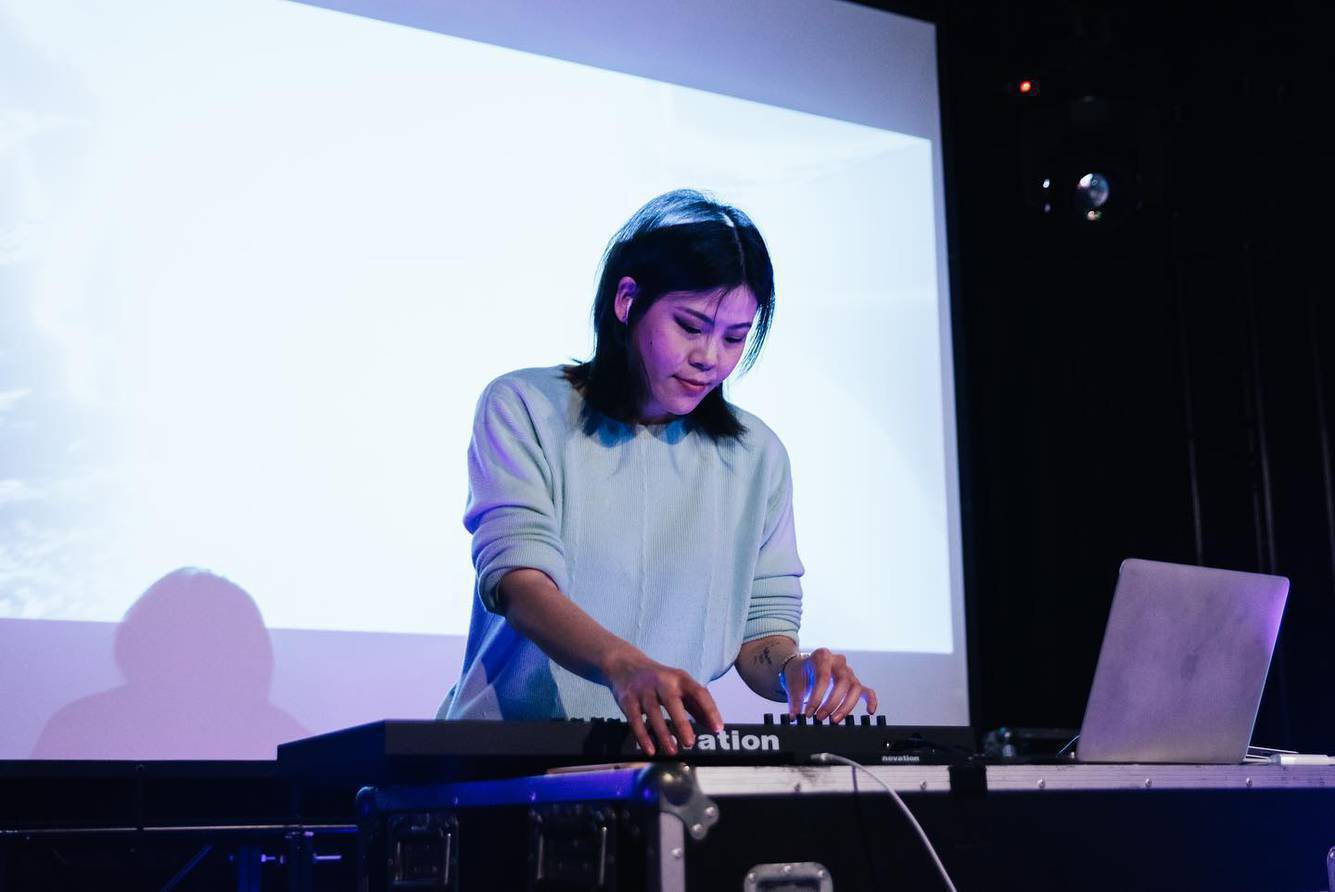
Sonia Calico. Photo credit: Synergy Festival
Lee Yen-yi: I’m Yen-yi. I’m an independent curator. I originally was very interested in contemporary art. But because I had the opportunity to work at digital arts festivals. I became a curator more connected with digital art, as a result.
My curatorial and research interests are related to failure. I like to discuss failures or spaces that were ignored by people, but which could lead to a space for creativity that we can’t imagine.
When people describe art, it’s in terms of its completeness. But in researching failure, I found that a lot of creativity comes from mistakes and failure.
My exhibitions have to do with the continuation of my research into failure. So I use exhibitions as a form of research. I discuss and produce works with my artists.
I like to work with different audience members. So besides just exhibitions, I also hope to reach different audiences through music. Music also has many notions and creates different sensations. So many of our exceptions may also have a party aspect or a listening session. We’d find electronic music artists, to have music linked to the exhibition.
Then, I had the opportunity to chat with Sonia. We had many shared friends and we started discussing digital art and electronic music. We discussed what we wanted to do.
During COVID, she had a lot of thoughts, and so we started planning the Synergy Festival.
BH: How did the SYNERGY FESTIVAL begin?
SC: Why did we decide to start this during COVID? Because COVID is the least suitable time to organize a music festival.
Part of it is because in the past, I often performed outside of Taiwan. In Taipei, I would primarily play at some friends’ activities. But because of COVID, I’ve been stuck in Taiwan.
I also released my first album recently. An album release should normally be a big thing, involving touring, but this wasn’t possible due to COVID. And many international artists could not travel to Taiwan. So I’d find that everyone was always booking Taiwanese DJs. If international artists can’t come to Taiwan, this might be an opportunity to focus on Taiwanese creators.
Apart from organizing parties, I have a music label called UnderU. I also have a workshop called Beatmakers Taipei. I’m not sure if it’s because of these two projects that I know a lot of creators or because I know a lot of creators that I wanted to do these projects at this point. [Laughs]
But if electronic music is to have roots in Taiwan, there has to be Taiwanese producers or creators. Because electronic music culture is from abroad, this music came from abroad. I also listened to this music growing up, but I want to put my own thinking into my works. If I can’t put these thoughts from growing up into my music, how do I communicate with Taiwanese people that this music isn’t something superficial, that’s just from abroad? For Taiwanese ideas to be in this music and that this can be something we communicate.
Rock and hip hop are also forms of music from abroad. But in Taiwan, there’s already a local version of it. Taiwanese indie bands. There are already so many Taiwanese indie rock festivals. But it wasn’t like that twenty years ago. Twenty years ago, it was all cover bands, and everyone was singing guns and roses.
Hip hop was like that too. Back when Luxy was around, everyone was playing American hip-hop songs. But now you can even have a reality show about hip hop in Taiwan. They have their own culture in Taiwan.
Because I am very passionate about electronic music and clubbing culture, I believe it’s a very spiritual thing. Some people might think of it as entertainment, but for me, it’s not just that. It’s part of our souls? Our morals? How would you say it? That it’s very core.
In Taiwan, many mainstream views look at clubbing as just Xinyi District, drugs, picking up passed girls, or whatever. But for us, it’s not like that. Or for you either.
LYY: There are some very inclusive things.
SC: That’s right. Because of clubbing, you can get to know different cultures. And know what it is to respect people with very different backgrounds or viewpoints to you. It’s only because of clubbing or electronic music that this could happen.
It’s like that for me. Because of clubbing, I got to know people from many different countries. For Taiwanese, what’s abroad might be thought of as just being the US and UK. That’s all. But although the label I currently distribute on is based in London, they often distribute Southeast Asian or West African music. When I collaborate with them, I come to understand things in other countries, get to know their producers, and talk with them. For me, this is a very rare opportunity.
I also think it’s possible to establish this in Taiwan, so that it’s not just seen as a foreign culture. If Taiwan has its own creators. That’s why, with UnderU, we wanted to distribute Taiwanese producers and songs. Beatmakers Taipei is more like a workshop, to have a place for bedroom producers to chat and make friends. Otherwise, it’s easy to stay at home, start doubting yourself, and give up.
For me, I feel there are many great creators. Because of these two projects and organizing parties, I wanted to see what could be done to focus on Taiwanese producers and beatmakers, so that Taiwanese people can see that the music they make is very good, that you don’t have to only listen to foreign artists or EDM.
LYY: Like Sophie, Arca, or Perfume, closer to us in Japan, they work with a songwriter, producer, and digital artists, to create very different MVs or performances. Most digital art is art museums now, but this isn’t the best place for this. Digital art is usually on a computer display or you might have different hardware and equipment. It might not be what a traditional art museum might have.
Interacting with audiences is another matter, along with whether performance might allow digital art to be seen differently. This is something that, as a curator, I always hope to accomplish. With the SYNERGY FESTIVAL this time, because you less commonly see this kind of combination, I hope that digital artists in Taiwan–the artists we picked this time themselves very much like club culture, but don’t have an opportunity or a stage for this kind of collaboration. So we started to plan this out with that in mind.
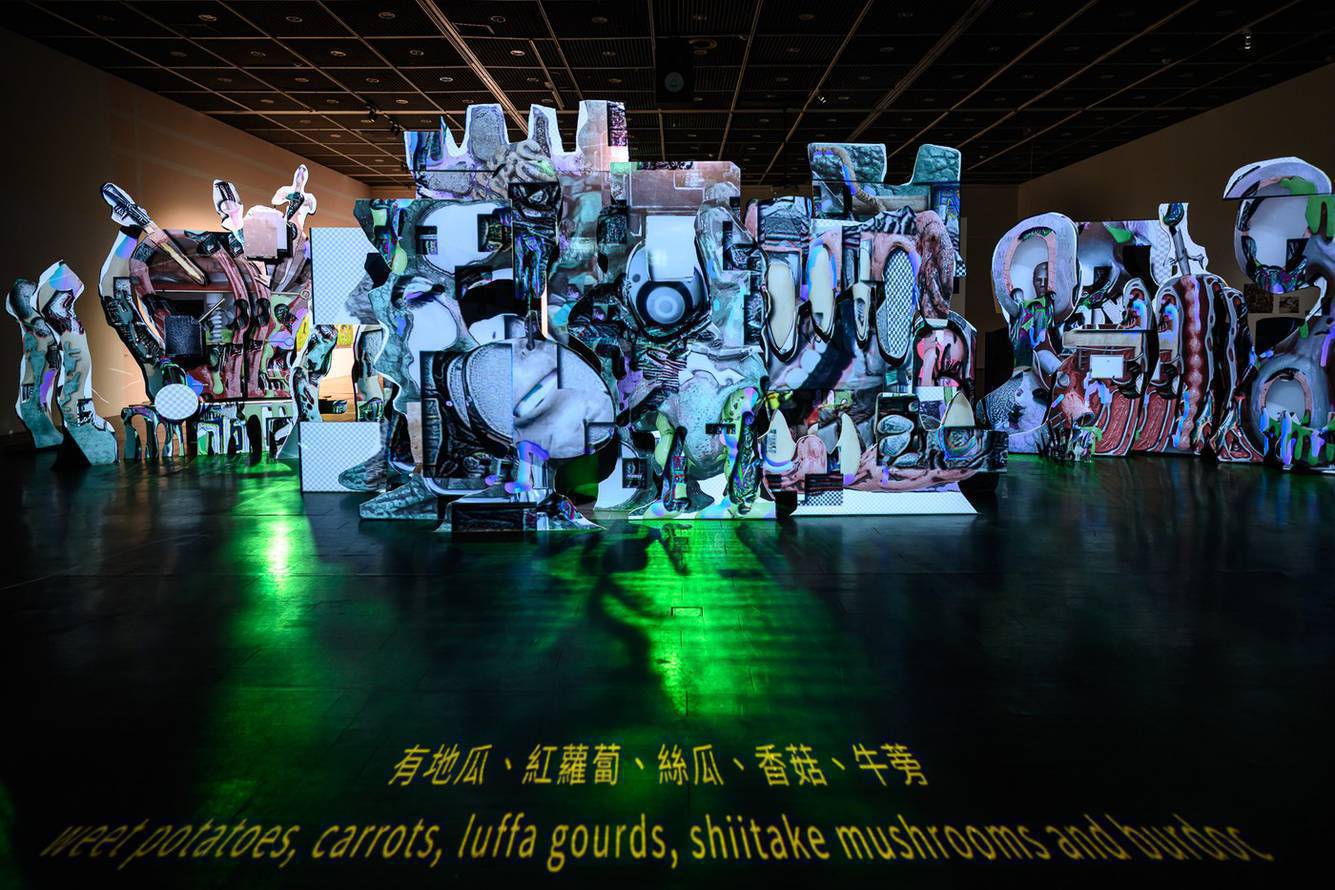
Photo credit: Synergy Festival
BH: You mentioned a bit earlier before the interview that you were hoping to introduce the concept of warehouse parties in Taiwan. There have also been a lot of events in Songyan recently.
LYY: It’s usually from the Taiwan Creative Content Agency in the past few years.
It’s easy to understand why people would want to pick a venue in the center of the city. Us picking a location in the center of the city also has to do with that we like the city and hope to have a different experience, with easier access, in the center of the city. That people can get to the venue quickly.
SC: Because we have digital art, the audio-visual aspects also have installation. It’s easier to control in an indoor location. It’s more common for music events to be on mountains or by the sea in Taiwan. To have the ambiance we want is difficult.
LYY: In participating in some warehouse parties, we also liked that atmosphere. The high ceiling, speakers, walls, and that kind of feeling was something that other venues can’t replace. We hope that there could be a sense of that in Taiwan.
The most well-known event in Taiwan in the past might be at the Nangang Bottle Cap Factory, organized by @llen. It might be the only time that really happened in Taiwan, so it occupies a special place in their hearts. We hope that the SYNERGY FESTIVAL can be a similar experience.
There are some limitations with Songyan, like that we can’t go too late. But among many venues, we thought it was the closest venue to a warehouse party that we could use. And we could use it right away. When we went to the No. 1 Warehouse, we had a good feeling. It’ll be interesting, when people see Songyan and a venue in Taipei used in a different way.
BH: How did you pick the performers? It’s quite broad.
SC: When it comes to picking the DJs, in the past in Korner, everyone was there., Later on, it’s like your people and my people. But I feel that if this is for allowing Taipei residents to understand electronic music, I want people from all different groups to come over. And it should be less cliquey. It’s hard to avoid if you have a club or events. Everyone’s friends and knows each other, but you might book different people, and different groups come to a club.
People didn’t make as many distinctions between techno or house or bass. I don’t know how to define my music either, so I don’t like this labeling, that you’re a techno DJ or house DJ. Good music is good music. I like techno a lot, too. And there’s a lot of that. If you want to make divisions, it’s hard to do that. House or techno are all forms of music I like.
We got HH. And LUDU. Many artists have their own audio-visual performances. Many are from the National Taipei University of the Arts. There’s experimental techno, but also music like mine, and other types. I like to listen to all this. Normally in an activity, you wouldn’t put us all together. But maybe it’s us. We wouldn’t want to divide that you’re non-mainstream or experimental.
LYY: It might have to do with our listening habits, that we listen to all sorts of music, and like all sorts of art.
SC: We believe that many people are like us. Our friends are eclectic, they like to go experience many different things. That might be why we have a wide-ranging line-up. As for digital art, we’re all people that go to artistic performances and know about them, but they might usually perform in art spaces or experimental spaces, there’s less of an opportunity to connect it with clubbing. They might have their own audiences. So we hope to have overlapping audiences and that our audience members have an open mind, that they can encounter some different forms of music.
BH: What would you describe as the other core values of the party?
SC: We’ve all been to many sorts of parties. Some parties you feel very comfortable. Other parties you might feel that you need to get a bit more drunk. And that if you get too drunk, it might be a bit dangerous! [Laughs] That it’s not as comfortable.
When we came together to make a music festival, we wanted to create a space where you could do whatever you wanted, but we all respected each other.
LYY: Sometimes nightclubs are supposed to be a safe space. Dancing is a form of healing. When I lived in Berlin, there was a time my house was broken into. My roommates and their computers were all stolen. We thought that we might have been targeted, since we had only left the house a short while, and the police called not long after.
My roommate and I were both women. I felt scared. So I decided to go out and party that night. [Laughs] And after partying, I felt better. You would feel that the people in the party weren’t out to trick you, that they also wanted you to have a good time, and that you could enjoy the night. When they hear good music, they’ll want to interact with you, but it won’t be trying to feel you up or anything like that. Like maybe smiling at you or asking how you are.
Although they’re strangers, it’s still an intimate feeling. That feeling will make you feel that it’s not only family or friends that will treat you well, but that strangers might also. I believe that’s the start for dialogue with different groups of people. Afterward, you might be like that toward strangers. That you’ll be friendly to them.
BH: So you’d say that’s what is special about club culture.
LYY: It’s a space outside family and friends. You can also become family and friends with people in clubs. But with people you don’t know, you can have a sense that they’ll respect you, or consensus. I think that’s very hard, it’s hard to find.
The one other place I’ve found this in Taiwan was on Qingdao East Road. During the movement. You had the sense that everyone was there, you would see the punks, and the hip hop crowd, the indie artists, the graffiti artists, and people in suits from works. If you slept there, nothing would happen to you. The sense of community was very strong and you all had a sense of mutual respect.
Outside of club culture, that was the one time I’ve experienced that. It’s sort of like that.
BH: Could you talk a bit about post-COVID clubbing? You brought up earlier that it’s very particular to be able to hold a party in Taiwan currently.
SC: We originally thought we might be the first festival or big club night after the measures were relaxed. But there were some more.
Last year in May, we didn’t know how long it would last. We originally wanted to hold it in October, but because we didn’t know the situation, we moved it to March.
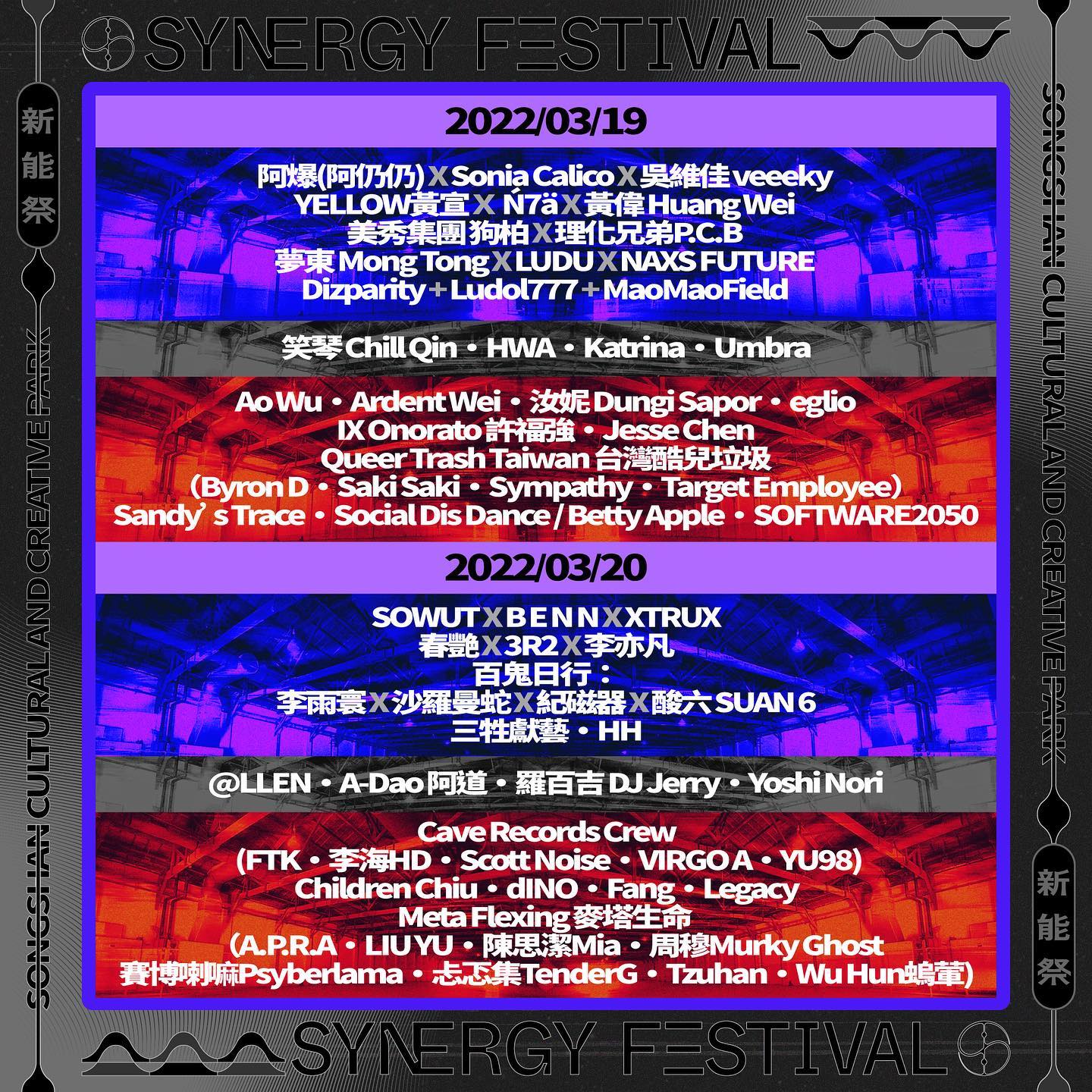
Event schedule. Photo credit: Synergy Festival
LYY: When Omicron was bad, we were quite worried. We thought it might be like last May again.
SC: Our theme for this music festival is that in linking digital and electronic music, so much of the work you see revolves around virtuality and reality. My own music is like that. Many digital artists want to discuss this as well. How to make reality more virtual or how to in a fictional world, to find the most real thing.
We’re all very interested in this subject. Is your identity fiction? Or is it real? Or are the two equally important to us that live in the present.
With COVID, everyone is at home, attending online parties or virtual galleries. You don’t have to go outside of your homes, but you find that some of what you were doing, you could do at home.
I forget who I was talking to, it was an artist, but I asked them what was different during COVID for them. They said there was no difference, they were at home in front of a computer. [Laughs]
For DJs, there are fewer gigs, but when you’re making music, you’re just in front of a computer, too. Attending online parties through the computer is also another thing you might do.
With this music festival, we’ve also planned many online happenings and offline happenings. Post-COVID clubbing was something we were thinking about when COVID was severe. But now, it’s something that we want to use to discuss art or music, and what direction it’s going in.
LYY: We also set up a virtual gallery this time around. We asked artists to set up an online exhibition space called Hubs by Mozilla. And we involved a number of open call artists, to show their works, and we picked on this basis.
Something that left a deep impression on me as we were setting up is that we tried to highlight the particularities of virtual spaces, not trying to recreate a physical space in a virtual world. There were a lot of exhibitions like this during COVID, including exhibitions that were planned but could not take place. Most of these used 3D scanning or many images that they put online.
This is one way. But with our artists, we were wondering what it might be like to participate virtually, and how many physical things you don’t need. Digital and physical lighting are completely different. So it changed how we thought about setting up an exhibition. With the mouse, pad, and display, we wanted to think about how people could use the virtual gallery, and how it could be something more than just replacing a physical space. What kind of artistic space would it be setting that up.
The virtual gallery is already open. It features “Flat Earth: Why isn’t the horizon curved when you take a photo?” by Lin Tzuhuan, “Water Skin” by veeeky wu wei chia, and “Virtual Ambiguity” by XTRUX. It’s quite fun.
BH: What are you planning on performing this time, Sonia?
SY: I originally thought about whether I should perform, since there was so much to do. But I eventually decided I should.
I’m working with ABAO for my performance. Our visual artist is Veeeky. Veeeky is someone I organized parties with in the past, we used to be a DJ duo. And we’ve worked together on many MVs.
I really like ABAO’s music and style. She has a very positive vibe. I feel that the things we do are somewhat similar. I’m always trying to connect the electronic music scene in Taipei. ABAO is trying to organize many Indigenous artists. She also has a workshop, to help them with making music and distributing.
If you listen to her music, you know that she’s passing this on. ABAO has worked with many artists. Her own albums are great. And I think music with her is great. She has a real sense about music. But I even asked her, I had no idea what she normally listens to. That her music works with anything.
She’ll sing some traditional melodies for beats by me. I’m looking forward to it very much myself. We practiced yesterday and we had some thoughts. But it’ll be very interesting.
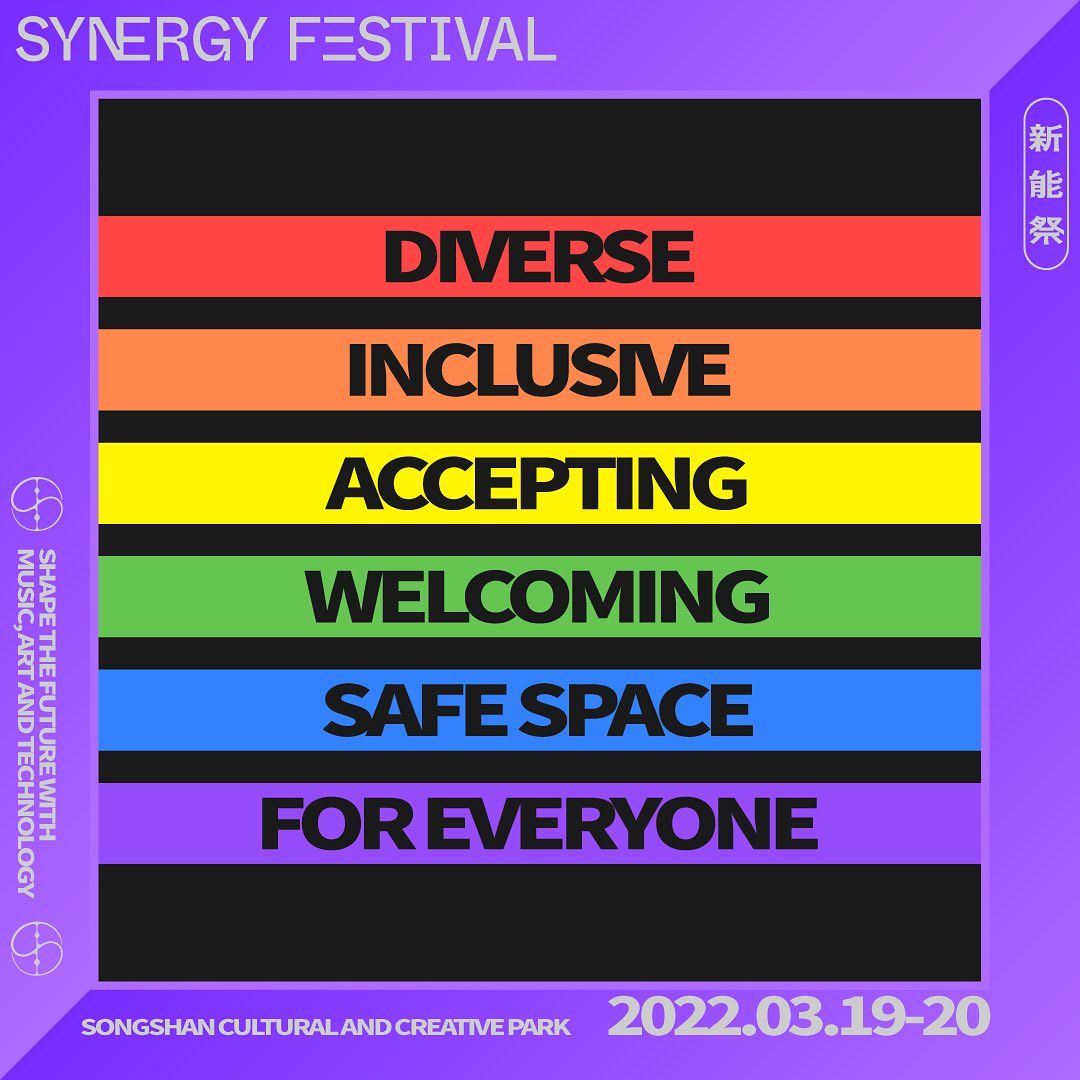
Photo credit: Synergy Festival
BH: Is there anything you want to say to readers, in closing? Particularly since we have many readers in Asia.
LYY: We’re here! Next stop is Southeast Asia and Hong Kong. We hope in the future, we might be able to develop more in this direction. We want to work with artists from the Philippines, from Southeast Asia.
SC: Because of COVID, we wanted to focus on some Taiwanese artists for the first year. But our road map for the second year through the fifth year is that if the COVID situation is okay, to invite Asian artists to Taiwan, allow them to collaborate with Taiwanese artists. You can imagine that we want to be like Sonar. We want to have panels, workshops, and forums. That you can party, but also exchange a lot of information, and that new possibilities can emerge from it. That there can be SYNERGY. [Laughs]
We hope that this can start in Taiwan and expand to other countries.


